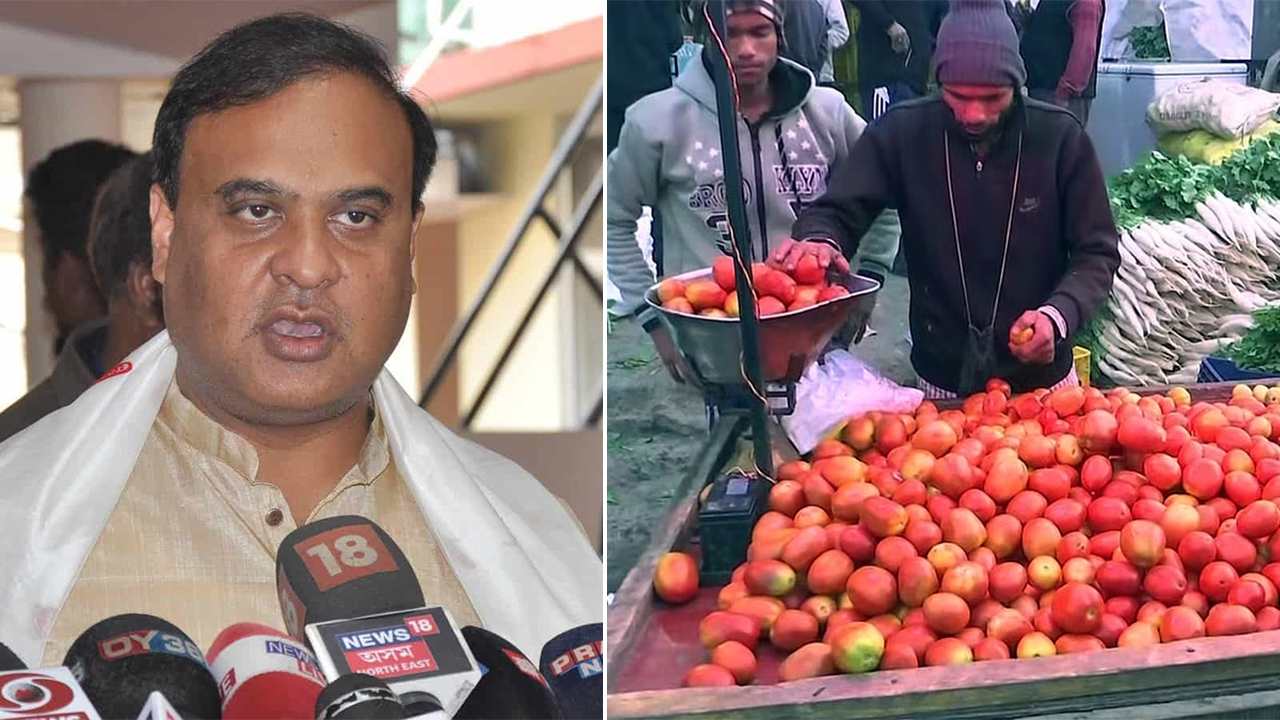Muslims are responsible for the steep rise in prices of vegetables in Assam. Yes, you read it right. Himanta Biswa Sarma, the Chief Minister of Assam, said that the prices of vegetables are witnessing a surge because most of the sellers of vegetables are from the ‘Miya’ Muslim community. A report by Tarak Mehta.
Assam, like the rest of the country, has been witnessing a steep hike in the vegetable prices for the last few weeks, which has irked the general public with many questioning the state government as there has been no respite from the price rise, often disrupting the quality of domestic life. On Thursday evening, while speaking to reporters, Himanta Biswa Sarma, the state Chief Minister, said that the prices of vegetables are witnessing a surge in Guwahati, the capital city of Assam, because most of the sellers of vegetables are from the ‘Miya’ Muslim community. Miya Muslims are descendants of migrant Bengali Muslims who migrated to the Brahmaputra Valley during the British colonisation of Assam in the 20th century.
The Chief Minister said that the price of the vegetables sold by the farmers in the village is not high, but when the same vegetables are brought from the village to the city and sold in Guwahati, their prices increase. Biswa Sarma, the blue-eyed boy of the BJP bosses in Delhi, said “They (East Bengal origin Muslims) have been taking high prices from the Assamese people. In Guwahati, ‘Miya’ people have taken control of the local vegetable markets”. He added that if an Assamese youth would have been selling the vegetables, he would not extract inflated prices from other fellow Assamese citizens. Sarma urged the Assamese youths to come forward, vowing to “drive away all the ‘Miya’ Muslim vegetable sellers from the city”. He also commented on vacating the space under the flyover in Guwahati where Miya traders are for generations selling vegetables and fruits.
The prices of vegetables have been soaring in India in recent weeks, putting a huge strain on household budgets. Tomatoes have seen the biggest price increase (over 200 percent), with some markets reporting prices as high as Rs 150 per kilogram. Other vegetables that have seen significant price rise include ginger, brinjal, onions and green chillies. Ginger, for instance, has seen a drastic spike, with prices ranging from Rs 250-350 per kilogram. Brinjal prices have surged from Rs 40 to Rs 100 per kilogram, while the prices of green chillies have reached an astronomical Rs 250 per kilogram and even higher in states like Assam and West Bengal.
Traders and farmers attribute this extreme price hike to a combination of factors. The intense heat wave followed by intermittent rainfall in June has disrupted the vegetable supply chain. The heavy rainfall in the last few days of July and the subsequent flooding of fields in many states of North India, has damaged tomato crops and other perishable vegetables especially onion, and ginger. Water-logging and flooding in some parts of the country, disrupting the supply chain from producer states have also created shortages in the market, leading to a sharp surge in prices. West Bengal, for example, has to depend on supplies from other states for several vegetables — including green chillies, ginger and tomatoes — around this time of the year.
Although the price rise of vegetables during this time of the year is seasonal, the situation this year is very dire, with prices increasing manifold. The rise in vegetable prices is now exerting pressure on the inflationary outlook for the near future. In June, food inflation rose to 4.6 per cent from 3.3 percent last month, on the back of hike in vegetable prices. The continuing surge in vegetable prices over the past few weeks could push retail inflation in July towards 6%.
Continuous rise in prices of everyday staple vegetables is a politically sensitive issue in India. It’s an issue that impacts the common people the most and makes the ruling state governments unpopular. The state governments try to ward off their responsibility by blaming the excess rains or the central government depending upon party affiliations. Many try to procure vegetables from the producers or mandis and supply them to the people at subsidised prices. Raids are being conducted at wholesale markets to catch middlemen and traders who hoard vegetables to take advantage of the situation.
Nowhere, however, has any government in the country so far attempted to communalise the price hike and has targeted the Muslim community for being responsible for it. Assam Chief Minister and BJP leader Himanta Biswa Sarma has now taken the RSS/BJP discourse of “criminalisation” and “otherisation” of the country’s largest religious minority to another level. The troll brigade on social media platforms, operated by the BJP’s IT cell, has communalised every tragedy — from the coronavirus induced pandemic to the recent Balasore train accident — as being part of Jihadi conspiracy. But Biswa Sarma happens to be the constitutional head of a state government and what he has said to reporters amounts to stigmatising an entire community and disturbing communal harmony.
If the top opposition leader of the country can be criminally prosecuted and stripped of his membership of Parliament for his remark made during an election rally, allegedly defaming all persons with “Modi” surname, Himanta Biswa Sarma, too, can be criminally prosecuted for his toxic communal outburst directed against the Miya community in Assam. But in Narendra Modi’s New India — the “mother of all democracies”— abusing and criminalising Muslims makes one a hero and brings to him greater rewards from the regime. Next time, the likes of Himanta Biswa Sarmas need not wait for price hikes to take effect, but can put the blame squarely on Muslims and hold them responsible for the natural calamities that occur in the first place.

